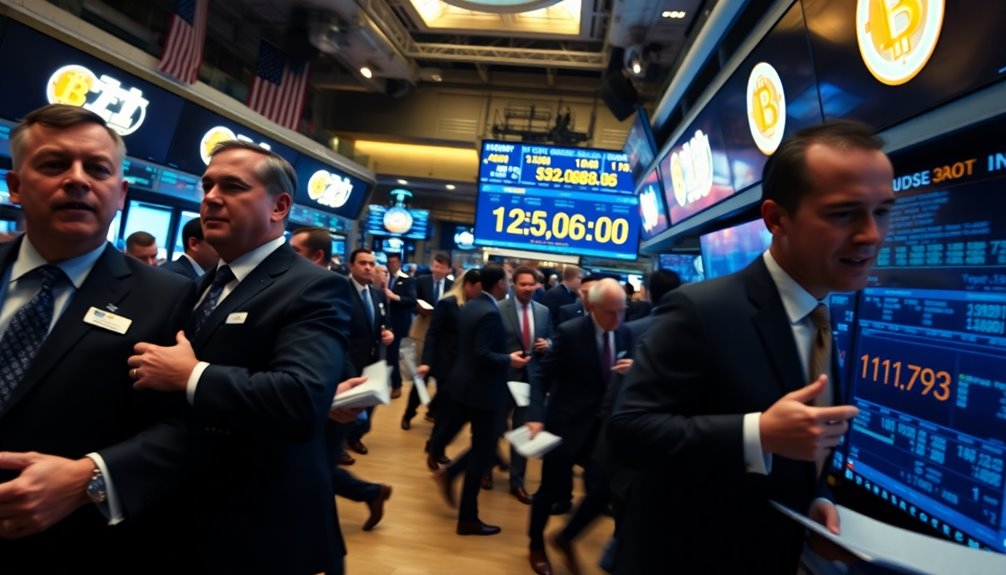You’re about to meet the five masterminds behind a shocking Russian money laundering empire. At the forefront is Ekaterina Zhdanova, the architect who coordinated complex international transfers. Georgy Rossi, the elusive associate, turned illicit funds into cryptocurrency. Then there’s Semen Kuksov, the cash launderer, and his co-conspirator Andrii Dzektsa, both deeply involved in laundering operations in the UK. Finally, Igor Logvinov, the captured courier, facilitated cash handovers across multiple countries. Each figure played a significant role in this underworld operation, and their stories reveal how they managed to evade capture for so long. Stick around to uncover the full saga. Their operation took a creative turn with the rise of memecoin mania on Telegram, exploiting the volatile world of digital currencies to further obscure their tracks. By leveraging anonymous channels and hype-driven crypto investments, they created a web of transactions nearly impossible to trace. Their ability to adapt to emerging technologies proved key to evading authorities for years. Despite their intricate network and clever tactics, the operation faced increasing scrutiny amid the treasury’s crackdown on money laundering. Law enforcement agencies worldwide began to connect the dots, employing advanced analytics to trace the obscured digital trails left in the wake of their transactions. As the pressure mounted, the masterminds had to stay one step ahead, continuously evolving their methods to avoid detection while maintaining the flow of illicit funds in an ever-tightening regulatory environment.
Key Takeaways
- Ekaterina Zhdanova led a money laundering empire, collaborating with ransomware gangs and managing complex international transfers.
- Georgy Rossi specialized in sanctions evasion for Russian elites, converting illicit funds into cryptocurrency for property purchases.
- Semen Kuksov laundered £12 million in cash, managing couriers for an organized crime group using encrypted communication.
- Andrii Dzektsa coordinated the laundering of over £12 million in the UK, utilizing shell companies and subletting properties to cash-paying immigrants.
- Igor Logvinov served as a courier, facilitating the laundering of around £700 million across 30 countries through various methods.
Ekaterina Zhdanova: The Architect

In the shadows of the international financial landscape, Ekaterina Zhdanova emerges as a pivotal architect of a sprawling money laundering empire. You'll find that she orchestrated complex international transfers, deftly maneuvering between fiat and cryptocurrency to conceal illicit gains.
Collaborating with associates, she converted cash to cryptocurrency and vice versa, facilitating transactions for notorious groups, including the Ryuk ransomware gang, which laundered $2.3 million in 2021. Zhdanova's operations relied on a vast network, utilizing connections with traditional businesses and a Dubai-based tax residency service to provide Russian clients with necessary identity documents and bank accounts.
She coordinated with key figures like Khadzi-Murat Dalgatovich Magomedov and Nikita Vladimirovich Krasnov to execute bulk cash and cryptocurrency laundering, employing companies like TGR Corporate Concierge LTD for monetary transfers. Moreover, her operations were intricately linked to criminal networks that spanned over 30 countries, cementing her role as a key player in facilitating organized crime and supporting Russian state interests.
Despite her sophisticated methods, Zhdanova faced serious repercussions. Sanctioned by the U.S. Treasury in November 2023 and arrested in France, she's been linked to a network that took a cut from billions laundered.
Georgy Rossi: The Elusive Associate

Ekaterina Zhdanova's intricate network of money laundering operations relied heavily on associates like Georgy Rossi, a shadowy figure at the helm of the TGR Group.
Born in Russia but raised in Ukraine, Rossi has become a master of evading law enforcement. Before relocating to Europe, he was deeply embedded in Russian banking, which provided him the expertise to facilitate sanctions evasion for Russian elites and transnational criminal organizations. His operations have become increasingly scrutinized as U.S. sanctions target networks supporting Russian elites.
Rossi's operations allowed him to convert illicit funds into cryptocurrency, enabling significant property purchases in Western countries.
Charging around 3% for transactions involving billions of pounds, he expertly routed funds through the Middle East, particularly the UAE. His network spanned over 30 countries, collaborating with dangerous entities like South American cartels and the Irish Kinahan crime syndicate.
In partnership with Zhdanova, Rossi's TGR Group played a pivotal role in laundering funds for cybercriminal activities, including ransomware payments.
The U.S. Department of the Treasury has sanctioned him, freezing his assets and prohibiting transactions. His whereabouts remain a mystery, adding to his elusive reputation in the world of international money laundering.
Semen Kuksov: The Cash Launderer

Semen Kuksov, a 24-year-old son of Russian oil executive Vladimir Anatolyevich Kuksov, stands at the center of a major money laundering operation that has drawn the attention of law enforcement across Europe. Charged by the UK's Crown Prosecution Service, he's guilty of laundering £12 million, or around €14 million, in cash.
On October 27, 2023, he pleaded guilty to two counts of entering into a money laundering arrangement.
Kuksov played a leading role in an organized crime group that laundered a total of £12,329,460 in the UK and €168,950 in Ireland from July 2022 to September 2023. He managed couriers to collect and deliver laundered money overseas while using encrypted chats, call data, cryptocurrency accounts, and CCTV footage to facilitate the operation. His activities not only enriched him but also funded further criminal enterprises, contributing to a total laundered amount of £12.32 million in the UK.
Despite his privileged background—having acquired Maltese citizenship just before Russia's invasion—Kuksov faces significant legal repercussions. He was sentenced to five years and seven months in prison on February 1, 2024, with potential implications for his citizenship status looming.
Andrii Dzektsa: The Co-Conspirator

Andrii Dzektsa emerged as a key co-conspirator in the money laundering network led by Semen Kuksov, playing a pivotal role in managing UK couriers responsible for collecting illicit cash.
From July 2022 to September 2023, you'll see how Dzektsa coordinated closely with Kuksov to facilitate the laundering of over £12 million in the UK and €168,950 in Ireland. His methods included using encrypted chat logs, call data, and cryptocurrency accounts to execute transactions discreetly. The operation was part of a larger scheme involving international ring operations that moved billions in crypto and cash.
Dzektsa's operations didn't just stop at cash collection; he employed traditional banking systems and shell companies linked to TGR to move money out of the UK to Russia.
He even sublet properties to immigrants who paid in cash from drug trafficking and prostitution. His connections ran deep, answering to Ekaterina Zhdanova, and collaborating with other criminals like Nikita Krasnov and Khadzi-Murat Magomedov.
Ultimately, Dzektsa's illegal activities led to his arrest in September 2023 and a five-year prison sentence handed down on February 1, 2024.
His conviction is part of Operation Destabilise, showcasing the extensive reach of international money laundering networks.
Igor Logvinov: The Captured Courier

Igor Logvinov, a fundamental courier in the expansive money laundering empire, was pivotal to the operations of Semen Kuksov's network. His role involved the essential task of cash handovers and laundering activities, allowing the network to function smoothly across 30 countries.
Logvinov coordinated with other members, facilitating the conversion of cash to cryptocurrency and moving large volumes of illicit money. In total, the network laundered around £700m as they facilitated these transactions.
Arrested by An Garda Siochana in Ireland, Logvinov was sentenced to three years in prison. His capture linked him directly to Kuksov's network, which was infamous for its international criminal activities.
He connected with Russian-speaking hackers, UK drug dealers, and Irish cartels, including the notorious Kinahans. Logvinov's activities weren't just limited to cash; he managed transactions involving millions of pounds, utilizing high-turnover cryptocurrency wallets.
Under the direction of key figures like Zhdanova and Krasnov, he employed various laundering methods, even using washing powder boxes as concealment.
His operations had ties to Russian state activities and facilitated transactions for sanctioned individuals. Logvinov's arrest marked a significant blow to the intricate web of criminal enterprises he served.
Frequently Asked Questions
How Did the Money Laundering Networks Operate Without Detection Initially?
Money laundering networks operated without detection initially by utilizing opaque corporate structures, which obscured ownership and sources of funds.
They exploited alternative financial channels like cryptocurrencies to bypass sanctions and move illicit funds.
Complex networks involving overseas banks and trade-based money laundering techniques made tracing funds difficult.
Additionally, the lack of centralized management reduced vulnerability to whistleblowers, allowing them to adapt continuously and evade regulatory scrutiny effectively.
It created a perfect storm for evasion.
What Specific Tactics Were Used to Convert Cash to Cryptocurrency?
Isn't it ironic how turning dirty cash into shiny cryptocurrency can seem so simple?
You'd see money mules opening multiple accounts with fake IDs, dodging identification processes. They'd transfer stolen funds to buy Bitcoins, splitting amounts to evade detection.
Meanwhile, tumblers mix dirty crypto, making it hard to trace. Peer-to-peer networks let them purchase Bitcoins directly from private vendors, while exploiting weak exchanges helps convert their illicit gains into clean currency.
How Did Law Enforcement Agencies Collaborate Internationally on This Case?
Law enforcement agencies collaborated internationally by sharing intelligence and coordinating operational strategies.
You'd see them working closely with various partners, like the UK's NCA and the US's FBI and OFAC.
They mapped out complex money laundering networks, exchanged data on suspicious transactions, and monitored cryptocurrency use.
This teamwork led to 84 arrests and significant asset seizures, showcasing how effective collaboration can disrupt global crime and enhance enforcement capabilities across borders.
What Penalties Do Those Convicted in These Networks Typically Face?
Imagine facing severe repercussions for your actions—if convicted in these networks, you're looking at hefty penalties.
You might find yourself designated by OFAC, with assets frozen and banned from U.S. transactions.
Prison sentences could stretch from 4.5 to 6 years for cybercrimes, while financial fraud might haunt you for years with investigations and prosecutions.
International cooperation means you won't escape easily; dismantling these networks is a priority, and the consequences are real.
How Has This Takedown Impacted the Cryptocurrency Landscape?
The takedown's impacted the cryptocurrency landscape considerably.
You've likely noticed increased scrutiny and regulatory measures aimed at tracing illicit transactions.
With law enforcement focusing on major players and networks, the use of blockchain analytics has surged.
This shift could lead to market volatility as entities attempt to bypass sanctions.
Additionally, you might see a rise in the development of tracing technologies, making it harder for unregulated services to facilitate anonymous cryptocurrency purchases.
Conclusion
As you reflect on the intricate web woven by these five masterminds, a chilling realization settles in—the shadows of their empire stretch far and wide, tainting the very essence of trust. Like a dark cloud looming over a sunlit day, their actions ripple through lives, leaving devastation in their wake. You can almost hear the rustling of dollar bills, a haunting reminder of greed's grip. In the end, justice must rise like dawn, casting light on the darkness they've created.









